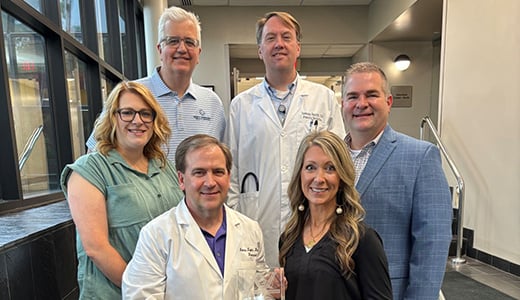NMHS Honored with AMGA's Inaugural Bridge Award
The American Medical Group Association (AMGA) recently presented North Mississippi Health Services with the group’s first Bridge Award for bridging the gap between research and practice.

- News & Media
- Press Releases
- 2025
- NMHS Honored with AMGA's Inaugural Bridge Award

NMHS Honored with AMGA's Inaugural Bridge Award
The American Medical Group Association (AMGA) recently presented North Mississippi Health Services with the group’s first Bridge Award for bridging the gap between research and practice.
TUPELO, Miss.—The American Medical Group Association (AMGA) recently presented North Mississippi Health Services with the group’s first Bridge Award for bridging the gap between research and practice.
The award celebrates the NMHS team whose leadership and vision led to the creation of Venous Thromboembolism (VTE) Care Connections service. VTE occurs when a blood clot forms in a vein and includes deep vein thrombosis (when a blood clot forms in a deep vein, most commonly in the legs) and pulmonary embolism (when part of the blood clot breaks loose and travels to the lungs). VTEs can be associated with chronic blood vessel disease, amputation and even death.
For patients with VTE, anticoagulant medications (commonly called “blood thinners”) must be sustained for at least three to six months, and sometimes longer if patients have certain risk factors for recurrence. Blood thinners can be very dangerous if not taken correctly and if taken with other medications that thin the blood. Additionally, patients with VTE may have other health conditions that can lead to adverse events with therapy.
Because these patients typically have multiple health care providers across multiple settings, continuity is crucial to ensure safe and effective patient care.
Under an AMGA grant, NMHS launched this project in September 2022 to improve VTE care continuity and reduce hospital readmission rates. “When we started, almost one in every 10 patients who were discharged from NMHS hospitals, clinics and emergency rooms with VTE were readmitted to the emergency room or hospital within 45 days with another blood clot or VTE-related symptom, and 3% were readmitted with adverse bleeding events,” said James Taylor, PharmD, of NMMC’s Family Medicine Residency Center in Tupelo, who leads the initiative.
“We realized many patients who had been prescribed a blood thinning medication for a new blood clot weren’t getting their prescriptions filled because of the expense,” Taylor said. “These newer medications can cost $600-$700 per month for someone without insurance, and even with insurance, some have high copayments or deductibles that make it difficult to purchase. Additionally, we discovered patients weren’t taking the medication as prescribed, or pharmacies were not filling prescriptions appropriately because the dosing schedule is often confusing.”
Taylor and his team began calling all new patients with a diagnosis of VTE within 72 hours of being discharged from all NMHS hospitals, emergency rooms and NMHS clinics to make sure each patient could fill the prescription and understood the instructions. If there was a problem with either, the pharmacists helped them overcome it.
For patients who are discharged to a swing bed unit or nursing home, a pharmacist calls the nursing staff to ensure the patient’s medication is being administered properly. Pharmacists will also contact those patients who are discharged from these facilities to ensure continuity of VTE care.
After the initial calls, Taylor and his team follow up with each patient several times over the next six months. “We make sure they are adherent to therapy and are tolerating the medication,” Taylor said. “We also work with the patient’s health care provider to adjust doses or discontinue therapy, as needed.”
NMHS typically encounters around 50 new VTE patients each month, which means that Taylor and his pharmacy team log around 200 calls a month. It’s a big task, but one that is paying big dividends.
The 45-day readmission rate for recurrent VTEs or VTE-related symptoms has decreased from 9.8% to 3.9%. Not only are more patients taking their medication, but they are taking it correctly. Additionally, readmission rates for adverse drug events like bleeding complications in this population have decreased from 3% to 2.1% since the project launched.
“I appreciate the opportunity to assist our patients with their VTE care, especially since it has proven to provide high quality care and service to them,” Taylor says. “This project falls in line with North Mississippi Health Services’ mission and vision—to continuously improve the health of the people of our region and to provide the best patient- and family-centered care and health services in America.”